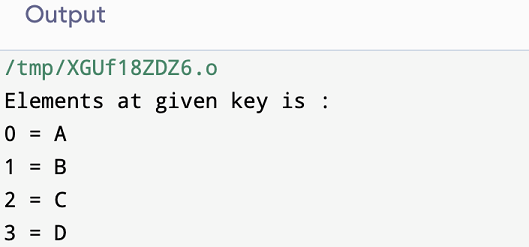C++ Tutorial
C++ Control Statement
C++ Functions
C++ Arrays
C++ Pointers
C++ Object Class
C++ Inheritance
C++ Polymorphism
C++ Abstraction
C++ Namespaces
C++ Strings
C++ Exceptions
C++ Templates
Signal Handling
C++ File & Stream
C++ Misc
C++ STL Tutorial
C++ Iterators
C++ Programs
MCQ
Interview Question
multimap key_comp() in C++In this article, you will learn about the multimap::key_comp() function in C++ with its syntax and example. But before discussing its implementation, you must know about the multimap in C++. What is Multimap in C++ STL?Associative containers, or multimaps, are comparable to map containers. Additionally, storing the components made up of mapped value and key-value pairs in a particular order makes it easier. It is possible for several elements in a multimap container to share a single key. The corresponding keys are always used to internally sort the data in a multimap. What is multimap::key_comp()?Multimap::key_comp () is part of the <map> header file. This function returns a duplicate of a key comparison object. By default, it is a less-than object that functions similarly as a less-than operator (<<). The multimap container's element keys are checked for order by the object. This function accepts two arguments, checks the keys, and returns true if the smaller of the two elements should come first; otherwise, it returns false. Syntax:It has the following syntax: Parameters: This function accepts no parameter. Return value: It returns a comparison object. Example:Let us take an example to illustrate the multimap::key_comp() function in C++. Output: 
Benefits of multimap key_comp():A standard template library (STL) container in C++ that is comparable to std::map but supports multiple elements with the same key is called std::multimap. The comparison object is used to compare keys and is retrieved using the std::multimap key_comp() member function. Some advantages of std::multimap's key_comp() include the following:
Next TopicObserver_ptr in C++
|
 For Videos Join Our Youtube Channel: Join Now
For Videos Join Our Youtube Channel: Join Now
Feedback
- Send your Feedback to [email protected]
Help Others, Please Share










